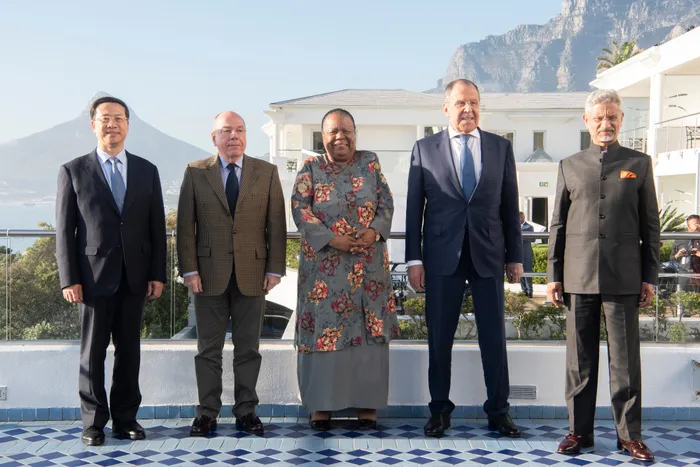It’s either the West’s way, or the high way

Foreign affairs ministers from the BRICS nations met in Cape Town. From left, Chinese deputy minister Ma ZHaoxu, Brazil’s Mauro Viera, South Africa’s Naledi Pandor, Russia’s Sergei Lavrov, and India’s Subrahmanyam Jaishanker. The talks came ahead of a heads of state summit in August. Picture: Rodger Bosch/AFP
Aleksei Malenko
On June 1, the Standalone BRICS Ministers of Foreign Affairs and International Relations Meeting was held in Cape Town, followed the next day by a meeting of the core of BRICS with representatives of a number of other states commonly called the BRICS Plus format.
The group was founded in June 2006 on the margins of the St Petersburg Economic Forum and initially included leading developing countries – Brazil, Russia, India and China.
South Africa joined the association in 2011.
According to Bloomberg agency statistics based on the IMF data, BRICS countries will have a share of more than 33% in global economic growth by 2028, while G7 countries will contribute less than 28%.
However, taking into consideration this indicator, BRICS countries have already surpassed the association of seven largest Western economies.
It is not a secret that many states are striving to join BRICS – Egypt, Algeria, Saudi Arabia, the United Arab Emirates and Mexico are among them.
Recently, Bangladesh announced its intention to join the group that is composed of five countries so far, days after Ethiopia did the same. Applicants for membership don’t have a unanimous view on geopolitical issues, represent various regions and cultures, have sometimes incomparable levels of economic development and, at first glance, have little in common.
But, if one digs deeper, it turns out that nevertheless they have a lot.
Their similarity lies in the fatigue of hegemony of the US dollar as a reserve currency in particular and in the unfair neo-colonial world order in general.
Most of the applicants for BRICS membership in one way or another suffered from the actions of the collective West, which, for centuries, used its superiority in technology, pumped out human and natural resources from the conquered territories in order to achieve its goals. It doesn’t hesitate now to threaten with economic sanctions and the use of force.
At the same time, back in 2019, Russian Foreign Minister Mr Sergey Lavrov characterised the problems the world community was facing as: “A serious threat to global economic growth is posed by such methods of unfair competition as unilateral economic sanctions, protectionism, trade wars, as well as outright abuse of the status of the US dollar as the world’s reserve currency.”
The words of the head of Russian diplomacy proved to be prophetic and even the most stubborn sceptics had to believe them over the past few years.
In the great spaces of the Russian web network, the enormous amount of the US government debt, caused by the uncontrolled printing of money to cover unthinkable government spending, has already become a byword.
But how else to ensure the existence of more than 800 US military bases around the world against the backdrop of a stagnant economic situation at home? Where to get funds for an endless injection into a black hole called Ukraine?
You can observe the unfolding financial tragicomedy for years, hoping to stay away, but recent events have shown that no one is immune from anything.
The West, which has arrogated to itself the moral right to be a mentor and judge for the “not free” behaves like a sheriff in the Wild West, but certainly not a fair one if we put aside the complicated official speeches and statements.
Western banks can suddenly freeze the assets of an individual or an entire state if it is necessary for Washington and other supporters of the neo-colonial world order.
At the same time, one doesn’t need to violate any international obligations – sometimes it is enough to pursue a policy of preserving state sovereignty, defending national interests, if this runs counter to the paradigm preached by the Western world.
Malenko is the consul-general of Russia in Cape Town.
Cape Times